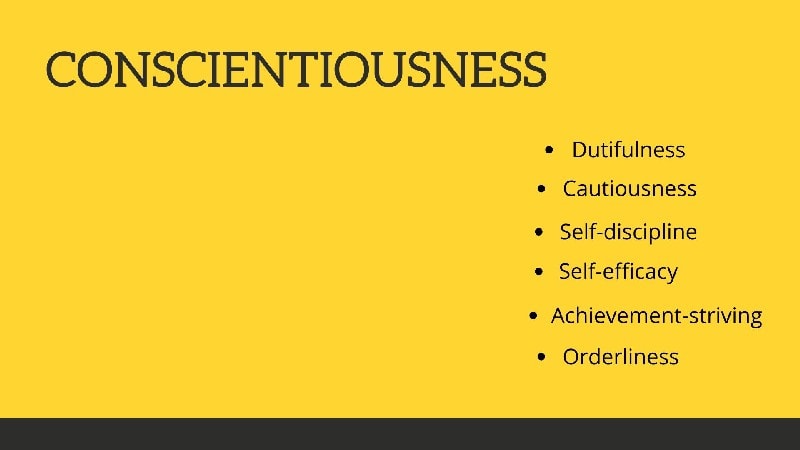
Understanding Conscientiousness: Types, Differences, and How to Develop it

Conscientiousness is the trait of being meticulous and reliable in fulfilling obligations to oneself and others It involves being diligent, organized, and responsible in one's actions and decisions
Conscientiousness is the act of fulfilling duties with utmost sincerity and taking obligations towards others seriously. This trait also encompasses qualities such as integrity, honesty, fidelity, justice, and morality.
Conscientiousness is an essential personality trait that greatly impacts personal, familial, and social well-being. As American writer and orator Robert Green "Bob" Ingersoll once stated during the Golden Age of Free Thought, "If there is any God, there is only one way to please him, and that is by a conscientious discharge of your obligations to your fellow men."
Understanding the concept of conscientiousness is crucial in the realm of business and personality management. This article delves into the intricacies of conscientiousness and explores how one can adopt the traits of a conscientious individual.
Conscientiousness in Personality Test Theories
According to the Big Five Personality Test Traits, there are five traits of people that decide the overall personality of individuals. All five features include-
Openness
Conscientiousness
Extraversion
Agreeableness
Neuroticism
The combination of an individual's behavior, consciousness, discipline, and mindset is significant in determining their personality traits. Studies have shown that this is crucial in understanding an individual.
One of the essential traits of an individual is openness, which reflects their willingness to challenge authority and their open-mindedness.
Conscientiousness is about organizing ability and self-disciplined characteristics of the individual.
Extraversion checks social well being and the outgoing thing.
Agreeableness indicates a person’s friendly and courteous manners.
Lastly, the stability and balance of a person are decided by Neuroticism.
Balanced living is crucial for overall well-being and longevity. One's behavior and ability to manage responsibilities are key indicators of their personality traits. Experiencing excessive stress and aggression can lead to a dull and depressed life. To combat this, it's important to cultivate organizational skills and discipline. Understanding conscientiousness and other traits can aid in achieving this balance.
A conscientious individual is essential in maintaining self-discipline. This type of person tends to strive for perfection, may exhibit compulsive behavior, and often has a strong work ethic. In the following section, we will delve deeper into the key characteristics of conscientiousness.
What is Conscientiousness?
Individuals with high levels of conscientiousness exhibit self-discipline and are characterized by their organized approach, strong work ethic, and focus on achieving their goals. They prioritize taking the necessary time to plan and arrange their tasks through a structured schedule, rather than making hasty decisions.
And not only this, consciousness includes responsibility, reliability, and self-control. Impulse control and self-regulation are also associated with conscientiousness.
Behavioural Patterns of High & Low Levels of Conscientiousness
Low and high level of conscientiousness, both are bad when exceeding the normal range.
People with high conscientiousness are more inclined towards perfecting themselves.
Following a predetermined schedule and avoiding impulsive decisions is a key aspect of their work philosophy. By focusing on self-improvement, individuals can minimize their stress levels and remain productive. However, the pursuit of perfection can also become a double-edged sword, leading to anxiety and frustration.
At times of low conscientiousness, individuals tend to value spontaneity and adaptability, venturing beyond their comfort zone and exploring unconventional approaches. However, just like in high conscientiousness, this mindset may not always be beneficial for overall well-being.
When people don’t worry about discipline, they are careless and unreliable.
They take an instant decision because they do not have the time to think and plan anything. So both have pros and cons.
It is advisable for individuals to maintain a healthy level of conscientiousness. This ensures a well-balanced lifestyle that involves effective self-management and yields positive outcomes.
Now, in the next section, we will have a look upon the different traits that conscientious people incorporate-
Traits of Conscientiousness
As conscientiousness is one of the characteristics of the Big five Personality Test Traits, there are sub-traits of it as well.
Six sub traits that play a crucial role in deciding the conscientiousness of an individual are-
Dutifulness
Cautiousness
Self-discipline
Self-efficacy
Achievement-striving
Orderliness
These are the deciding factor of the level of conscientiousness. Let us now understand these sub traits in a more detailed manner.
Being dutiful and cautious are two key traits of a conscientious individual. A self-disciplined person understands the importance of being devoted to their work and taking associated tasks and responsibilities seriously. On the other hand, a cautious person is always aware of potential dangers and takes precautionary measures to avoid any negative consequences. Together, these traits enable a conscientious individual to adeptly complete their duties without being hindered by unforeseen obstacles. It is crucial for success in life to possess these important qualities.
"Self-efficacy is the belief in one's ability to succeed in specific situations or accomplish a task." When a person has a high level of self-efficacy, they are confident in their own abilities and are more likely to take on challenges and succeed in their endeavors. This trait is closely tied to discipline, as a self-disciplined person is more likely to have the focus and determination necessary to build their self-efficacy.
To achieve success, individuals must possess a strong belief in their own abilities and be able to face and overcome the obstacles and challenges that life presents. This requires resilience and a determination to persist in the pursuit of one's goals. Those who remain focused on their aspirations and do not stray from their chosen path are said to possess achievement-striving, a key trait of conscientiousness and goal-oriented individuals.
Factors influencing Conscientiousness
Being organized, systematic, and consistent are key traits of a highly conscientious individual. Maintaining a clean and tidy environment, as well as demonstrating diligence, are essential components of orderly behavior. All of these factors are interconnected and contribute to an individual's overall level of orderliness.
Individuals exhibit different levels of conscientiousness that may also change over time. This trait cannot be duplicated or remain unchanged in every person. Conscientiousness is influenced by a variety of factors such as one's environment, social circle, and cognitive abilities.
Children who receive affection from their parents tend to exhibit a higher level of conscientiousness, according to a survey. Conversely, children whose parents live away from them are more likely to experience stress and demonstrate lower levels of conscientiousness.
Love and respect hold significant value in a person's consciousness, which is closely tied to the brain. The brain's structure plays a crucial role in shaping an individual's conscientiousness. Additionally, societal influences and peer pressure can also impact a person's behavior.
Also, one’s way of handling any situation has been a prominent factor that influences conscientiousness.
Final Thoughts about Conscientiousness!
A high level of conscientiousness can lead to individuals striving for perfection in their work and personal life. This can result in being organized, goal-oriented, and cautious, but may also lead to an unhealthy fixation on achieving flawlessness.
And it can be not very helpful at times when a person can’t achieve his/her goals he/she feels betrayed.
Therefore, it is essential to maintain the level of conscientiousness.
Strive for a level of conscientiousness that is neither too low nor too high. Being too careless or striving for perfection can both have negative consequences, so finding a moderate level can be more beneficial for achieving success in life.
Do you have conscientiousness? What traits of a conscientious person do you incorporate?
Tell us about your thoughts about the concepts of conscientiousness in the comments below.
















